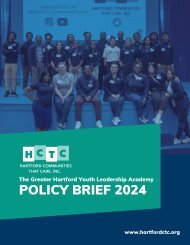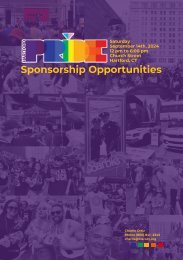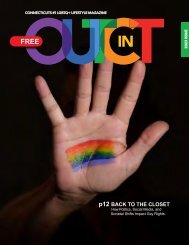OUTINCT 2022
Create successful ePaper yourself
Turn your PDF publications into a flip-book with our unique Google optimized e-Paper software.
We must demystify the idea that younger children are “too
young” to learn about gender and sexuality. These may be
very core pieces of their identities. Although it might not
be as extreme as in states where the legislature is literally
passing “Don’t say gay” laws, in CT there are school districts
where contingents of parents do not want their children
involved in any conversation about gender and sexuality,
especially in elementary. Yet for LGBTQIA+ students,
according to GLSEN research, better school climate and
improved academic outcomes are significantly more likely
with curricula that are inclusive of LGBTQ people, history,
and events (https://www.glsen.org/inclusive-curriculum ).
We must disavow this harmful notion of leaning away from
teaching “intense” and “provocative” topics like the legacies
of systemic racism, homophobia and transphobia, because
these curricular tools may actually be the ones that ensure
generations moving forward can better navigate conditions
of equity and inclusivity than schools are in this moment.
Equity commitment is a practice, not a performance,
and as queer Black scholar Dr. Bettina Love pushes us
to consider, being a co-conspirator (not just an ally)
requires us to put something on the line, to take risks
(https://vimeo.com/502300589). Risk-taking requires that
educators feel their administration and Board have their
backs, have engaged in deep learning themselves, and
are adamant that this work is not an initiative we will see
evaporate in a year. The work must be consistent and the
learning is ongoing. Like all professional learning, one-off
trainings are not enough. Educators, staff, and all folx in
our buildings and on our buses need sustained, iterative
learning opportunities on gender and sexuality inclusivity.
These learning spaces must afford opportunities to:
COVID-19 Pandemic (https://library.ncte.org/journals/
elq/issues/v45-1/31976 )
Finally, we must center community practices that move
us beyond performance into legitimate commitment to
fostering inclusive spaces. We must: 1) prioritize LGBTQIA+
vendors, artists, authors, & performers who work with
our children, 2) offer learning for parents, families, and
caregivers, and 3) leverage librarians & library media
specialists for their brilliance in not only curating diverse
texts, but then supporting educators in using them. These
moves bring the structures of our Board policies to life
and inform curricular moves that take us beyond virtue
signals like the safe space sticker to environments where
youth would actually report felt and palpable impacts of
our commitment. Ultimately, the education to which all
children are entitled is one where we don’t have to tell
them we are co-conspirators for gender and sexuality
inclusivity, but rather it is evident through our policies,
practices, and relationships. Our commitment becomes
embedded, it is proactive rather than reactive, and it centers
understandings of the complex relationship of race, power,
gender, and sexuality, demanding education that looks at
people as whole beings and their liberation as humancentered,
grounded in love and justice.
1. explore how our own gender and sexuality
informs our teaching,
2. navigate tools and strategies for classroom
practices that center inclusivity for LGBTQIA+
identities and demonstrate an understanding
of human-centered teaching through an
intersectional lens,
3. scaffold changes in texts used such that
educators have support in navigating themes
that they may be uncomfortable and illprepared
to navigate with students.
Diversifying the books in our libraries means nothing
if they collect dust and never evoke the rich discussions
possible. One phenomenal place to start is exploring the
work of LGBTQIA+ scholars themselves like shea wesley
martin and Jessica Lifshitz in this article, Chasing Rainbows
in Stormy Weather: Reading and Discussing LGBTQ+
YAL as Liberatory Professional Development During the
FREE
DRIVE-UP
COVID-19 TESTING
131 COVENTRY STREET
HARTFORD, CT
FOR MORE INFORMATION CALL
| 8






